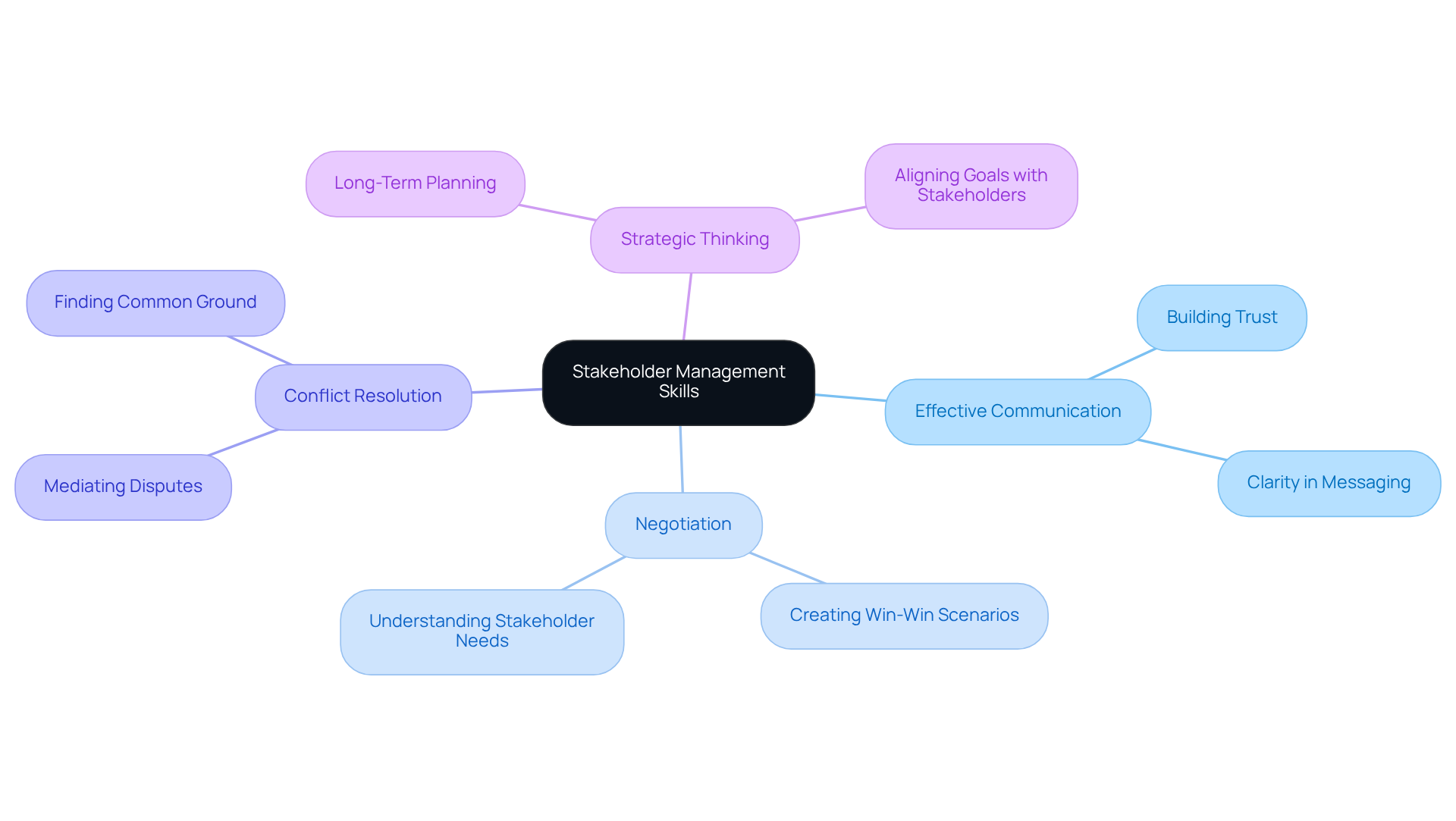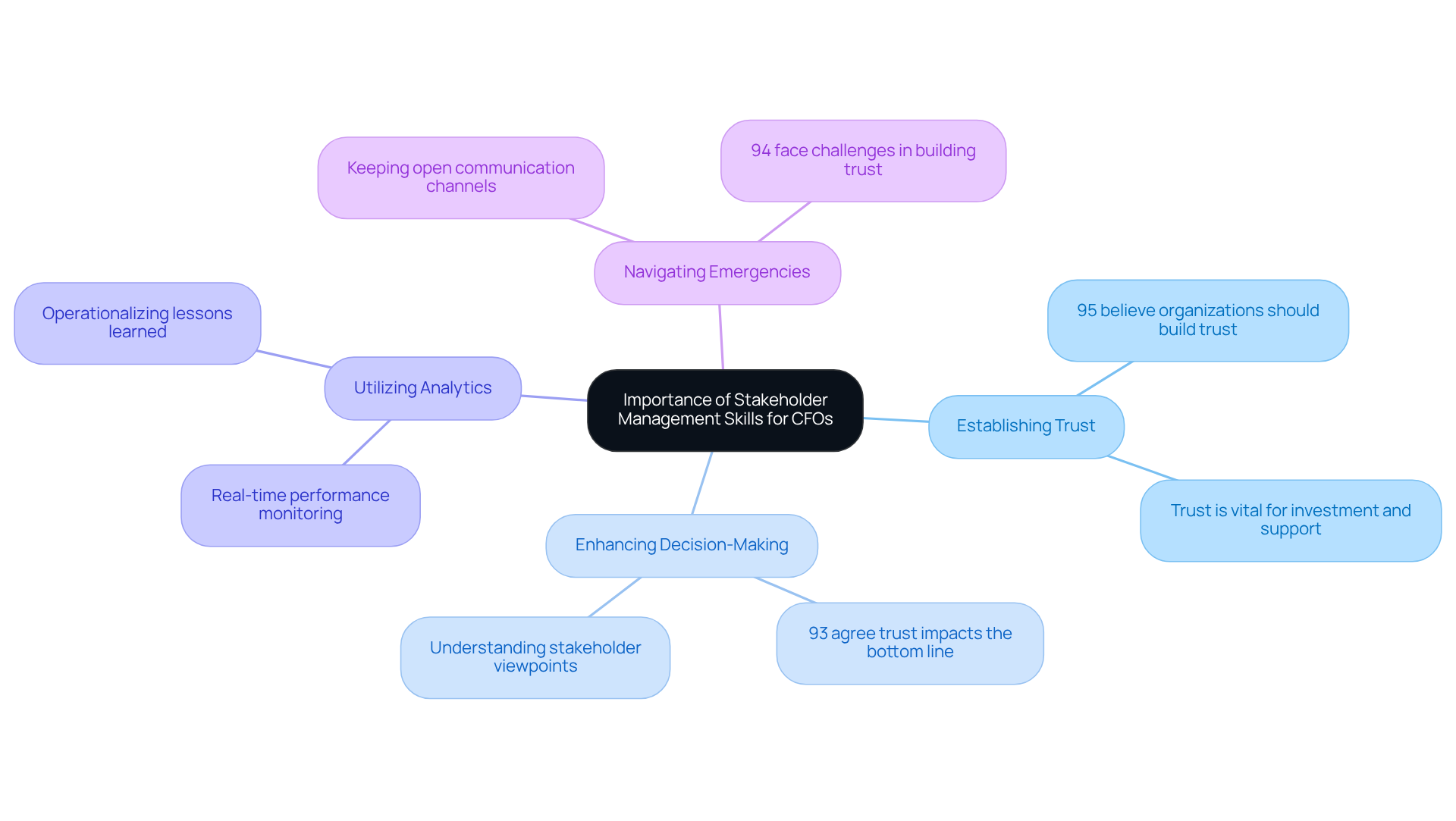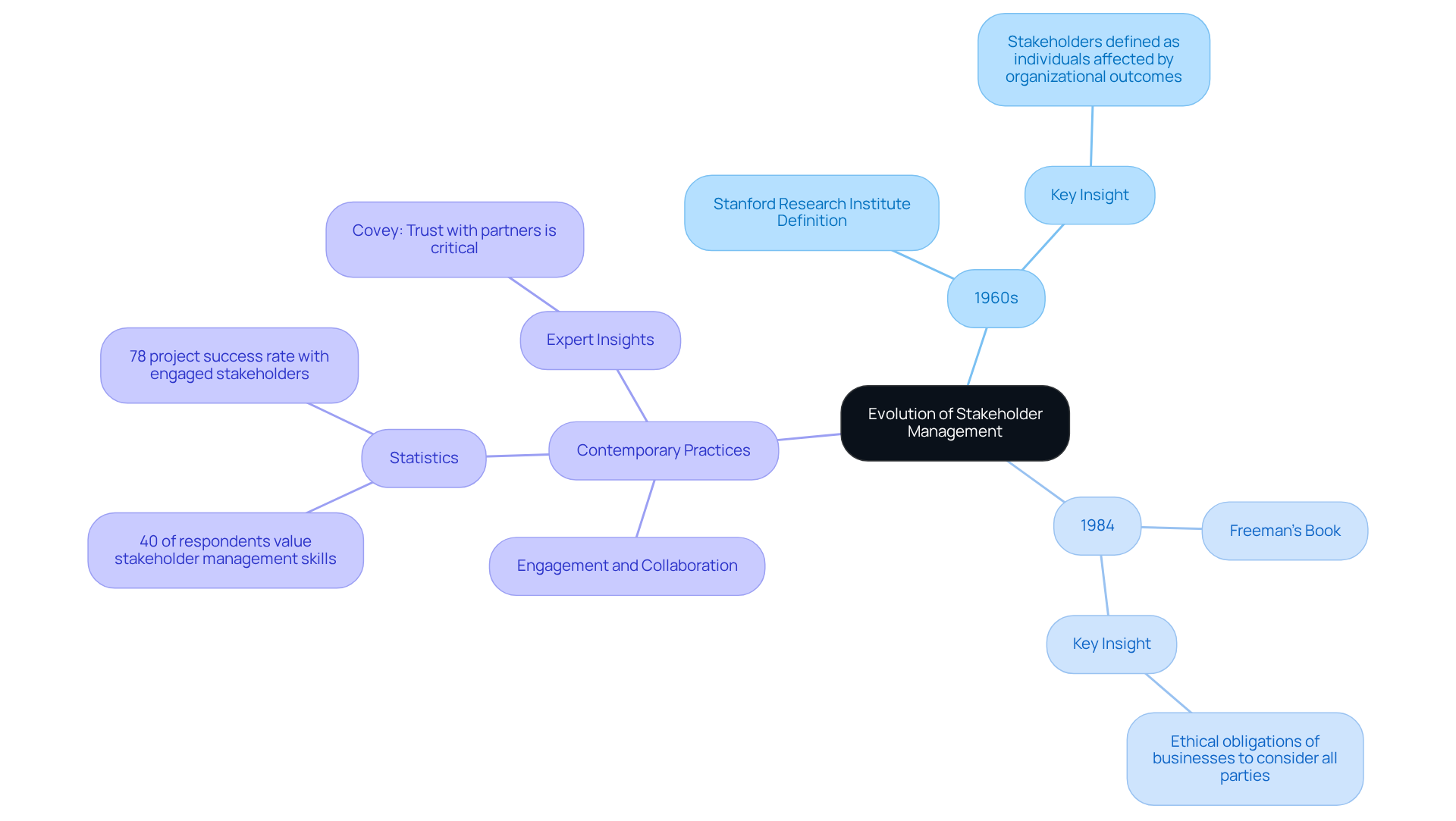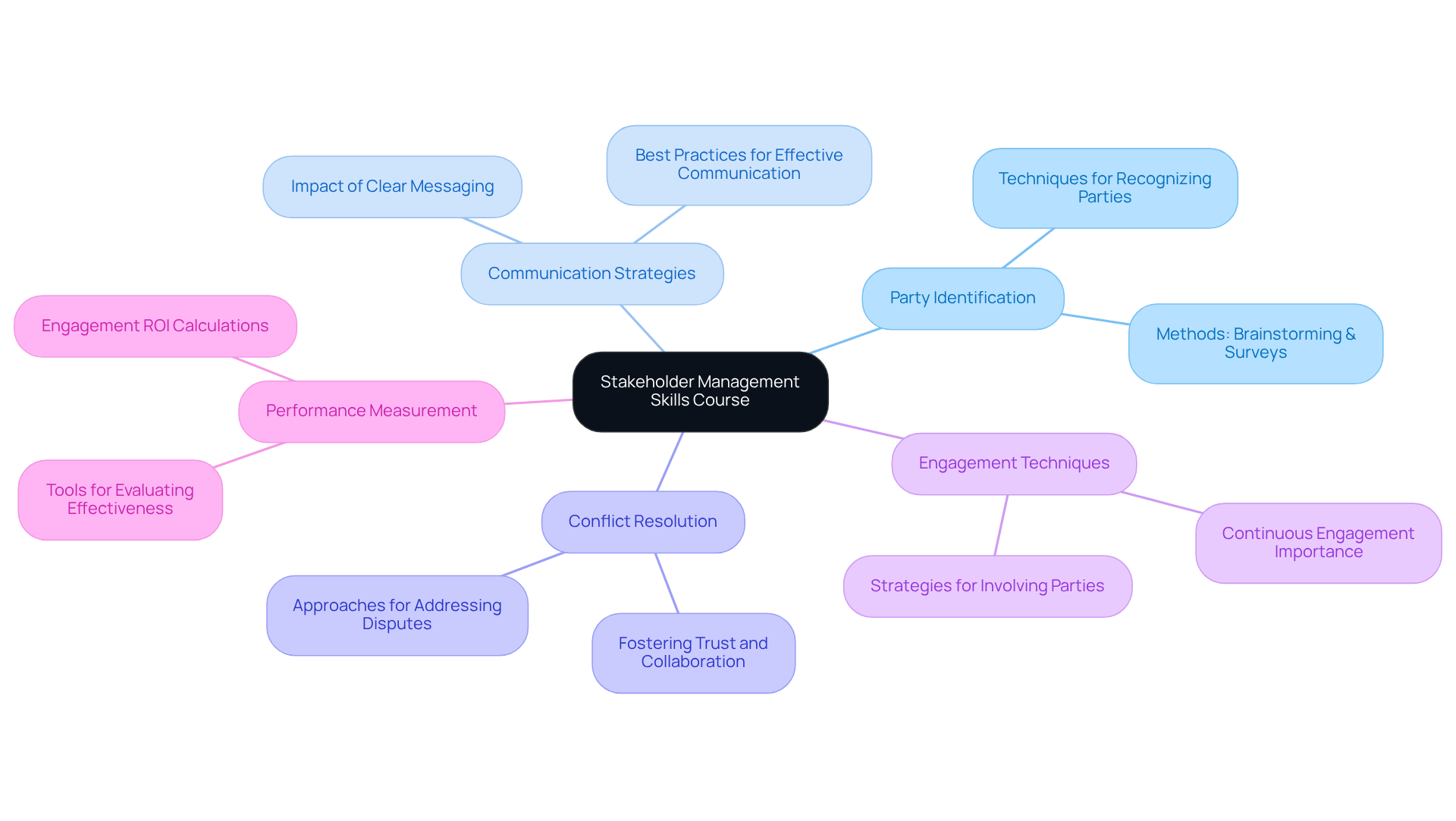Overview
The article underscores the critical importance of stakeholder management skills for CFOs, asserting that these competencies are vital for effectively engaging with stakeholders to propel organizational success. It articulates that mastering skills such as communication, negotiation, and conflict resolution not only fosters trust and enhances decision-making but also significantly boosts project success rates and fortifies organizational resilience, particularly during periods of financial restructuring.
Introduction
In an increasingly complex financial landscape, the ability to effectively manage stakeholder relationships has become an essential skill for CFOs. This article explores the significance of stakeholder management skills, emphasizing how mastering these competencies can empower financial leaders to build trust, enhance decision-making, and drive organizational success.
With the stakes higher than ever, the pressing question remains: how can CFOs ensure they are equipped to navigate the intricacies of stakeholder engagement in a rapidly evolving business environment?
Defining Stakeholder Management Skills
Stakeholder management expertise encompasses the essential capabilities necessary for identifying, engaging, and nurturing relationships with individuals or groups integral to a company's operations and outcomes. These skills—effective communication, negotiation, conflict resolution, and strategic thinking—are vital. For financial leaders, mastering these competencies is not merely advantageous; it is imperative, as they navigate complex relationships with investors, employees, and other stakeholders. This mastery ensures that financial strategies are not only sound but also harmonized with broader organizational objectives.
Moreover, the ability to make swift decisions and leverage real-time analytics significantly enhances participant engagement, empowering CFOs to consistently monitor business health and adjust strategies as necessary. Research indicates that organizations with robust engagement practices can achieve a 30% higher adoption rate for new initiatives, underscoring the tangible benefits of effective management. Additionally, the stakeholder management skills course designed to develop these competencies has proven effective in enhancing engagement, equipping financial executives with the tools required to foster collaboration and drive organizational success.
In today's dynamic business landscape, effectively managing relationships with stakeholders is not just beneficial; it is essential for sustainable growth and resilience. The call to action is clear: financial leaders must prioritize stakeholder management to navigate complexities and propel their organizations forward.

Importance of Stakeholder Management Skills for CFOs
For financial executives, enrolling in a stakeholder management skills course is crucial for mastering the art of engaging with interested parties for various persuasive reasons.
Firstly, these skills, which are covered in a stakeholder management skills course, are essential in establishing trust and credibility with important stakeholders, vital for obtaining investment and assistance during financial restructuring efforts. A recent survey indicates that 95% of business executives believe organizations have a responsibility to build trust, highlighting its significance in financial contexts.
Secondly, participating in a stakeholder management skills course enhances decision-making abilities; financial leaders who understand stakeholder viewpoints can better align financial strategies with broader organizational goals. This alignment is particularly vital, as 93% of executives agree that maintaining trust positively impacts the bottom line.
Moreover, by utilizing a client dashboard for real-time analytics, financial leaders can continuously monitor business performance and operationalize lessons learned from turnaround processes, fostering strong, lasting relationships.
Finally, these abilities are essential during emergencies, and a stakeholder management skills course can significantly aid in keeping open channels of communication to reduce risks and enhance organizational resilience. In fact, 94% of executives report facing challenges in building trust, underscoring the need for proactive engagement strategies. By refining skills in dealing with interested parties, CFOs can navigate financial restructuring more effectively, ensuring sustainable growth and stability.

Historical Context and Evolution of Stakeholder Management
The concept of managing interested parties emerged in the 1960s when the Stanford Research Institute defined these individuals as stakeholders in an organization's outcomes. Edward Freeman's 1984 book, 'Strategic Management: A Stakeholder Approach,' significantly popularized this notion, emphasizing the ethical obligations of businesses to consider the interests of all parties involved. Over time, the focus has evolved from merely managing interested parties to actively engaging them in decision-making processes. This shift reflects a broader understanding of corporate responsibility and the interconnectedness of business relationships.
Statistics underscore the significance of this evolution; for instance, 40% of respondents identified the stakeholder management skills course as the most crucial process for managing project participants and ensuring project success. Furthermore, companies that improve their stakeholder management skills through a stakeholder management skills course are 50% more likely to engage with interested parties and achieve their significant objectives, illustrating the tangible benefits of effective engagement with stakeholders.
Incorporating insights from industry experts can further enhance our understanding. As Stephen M.R. Covey notes, trust with partners is a critical leadership competency, aligning with the contemporary emphasis on collaboration and transparency in interactions with stakeholders.
Real-world applications illustrate the impact of effective participant oversight. Organizations that implement strong participant engagement practices and attend a stakeholder management skills course report a notable increase in project success rates, with 78% of projects succeeding when participants are actively involved, compared to only 40% when engagement is limited.
Additionally, developing a robust communication strategy and fostering close cooperation with interested parties are essential components taught in a stakeholder management skills course for effective engagement. This transformation is particularly significant for chief financial officers, who now play a crucial role in integrating diverse viewpoints into financial strategies, thereby promoting sustainable growth and enhancing organizational resilience.

Key Components of a Stakeholder Management Skills Course
A comprehensive stakeholder management skills course for CFOs encompasses several critical components designed to enhance their effectiveness in engaging with stakeholders:
-
Party Identification: Techniques for recognizing and classifying parties based on their influence and interest are crucial. Employing methods such as brainstorming and surveys significantly enhances the precision of identifying involved parties, ensuring that all relevant individuals are accounted for.
-
Communication Strategies: Best practices for effective communication tailored for various interest groups are essential. Research indicates that companies that interact with their audience are 30% more likely to succeed with new products, underscoring the importance of clear and concise messaging.
-
Conflict Resolution: Approaches for addressing and resolving disputes that may arise between parties are vital. Effective conflict resolution strategies foster trust and collaboration, which are fundamental for maintaining robust relationships.
-
Engagement Techniques: Strategies for actively involving interested parties in decision-making processes are necessary to ensure their voices are heard. Continuous engagement throughout the project lifecycle enhances support and adaptability to changing needs.
-
Performance Measurement: Tools for evaluating the effectiveness of party management efforts and making necessary adjustments are critical. Implementing engagement ROI calculations can help determine the impact of stakeholder interactions on project success.
These components equip CFOs with the skills gained from a stakeholder management skills course to cultivate strong relationships, enhance collaboration, and drive organizational success.

Conclusion
Mastering stakeholder management skills is not merely a valuable asset for CFOs; it is a necessity in today's intricate financial environment. The ability to effectively engage and nurture relationships with diverse stakeholders is crucial for driving organizational success and ensuring that financial strategies align with overarching business objectives. As CFOs navigate these complex dynamics, the importance of prioritizing stakeholder management becomes increasingly evident.
Throughout the article, several key insights have been highlighted, including the essential components of a stakeholder management skills course, such as:
- Communication strategies
- Conflict resolution techniques
- Performance measurement tools
These elements equip financial leaders with the capabilities to build trust and credibility, enhance decision-making, and foster collaboration. Moreover, the historical evolution of stakeholder management practices underscores the growing recognition of the need for proactive engagement in achieving organizational resilience and sustainable growth.
In light of these insights, it is imperative for CFOs to actively seek opportunities for stakeholder management training and development. By investing in these skills, financial leaders not only enhance their own effectiveness but also contribute to the overall health and success of their organizations. Embracing this approach will empower CFOs to navigate the complexities of stakeholder relationships, ultimately driving their organizations toward a more prosperous future.
Frequently Asked Questions
What are stakeholder management skills?
Stakeholder management skills are essential capabilities for identifying, engaging, and nurturing relationships with individuals or groups that are integral to a company's operations and outcomes. Key skills include effective communication, negotiation, conflict resolution, and strategic thinking.
Why are stakeholder management skills important for financial leaders?
For financial leaders, mastering stakeholder management skills is imperative as they navigate complex relationships with investors, employees, and other stakeholders. This mastery ensures that financial strategies align with broader organizational objectives.
How does effective stakeholder management impact organizational initiatives?
Research indicates that organizations with robust engagement practices can achieve a 30% higher adoption rate for new initiatives, highlighting the tangible benefits of effective stakeholder management.
What tools can enhance stakeholder engagement for financial executives?
The stakeholder management skills course is designed to develop essential competencies, equipping financial executives with tools to foster collaboration and drive organizational success.
Why is stakeholder management considered essential in today's business landscape?
In today's dynamic business environment, effectively managing relationships with stakeholders is essential for sustainable growth and resilience, making it a priority for financial leaders to navigate complexities and propel their organizations forward.




